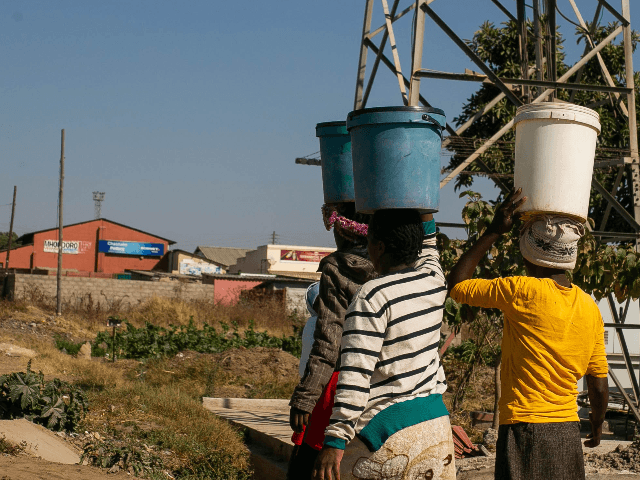The Trump administration on Thursday ordered the State Department and U.S. Agency for International Development (USAID) to freeze between $2 billion and $4 billion in aid authorized by Congress during the 2018 and 2019 fiscal years.
The order was issued on the same day $45 million in food aid was announced for drought-stricken Zimbabwe, which urgently needs over $330 million in aid according to the United Nations.
Zimbabwean President Emmerson Mnangagwa declared the drought a natural disaster on Tuesday as the head of the U.N. World Food Program (WFP), David Beasley, said 2.5 million Zimbabweans are threatened by starvation.
“We are talking about people who truly are marching towards starvation if we are not here to help them. We are facing a drought unlike any that we have seen in a long time,” said Beasley.
The U.S. responded quickly to the U.N. appeal by pledging $45 million in aid to feed over 360,000 Zimbabweans.
“The United States remains the largest bilateral donor to emergency humanitarian assistance in Zimbabwe and we are proud to be part of a coordinated response to the humanitarian situation,” noted U.S. Ambassador to Zimbabwe Brian Nichols.
The U.S. Office of Management and Budget (OMB) on Thursday called for a freeze on expending “unobligated resources,” referring to several billion dollars in foreign aid approved by Congress in 2018 and 2019 but as yet unspent. The appropriations are due to expire if the money is not spent by September 30, the end of the fiscal year.
The move angered some humanitarian groups and congressional representatives, as quoted by Voice of America News:
“This administration’s contempt for Congress is astounding,” said House Committee on Foreign Affairs Chairman Eliot Engel. “When Congress decides how much we can spend on foreign assistance, it isn’t a suggestion. It’s the law, backed up by the Constitution.”
The New York Democrat added that the Republican administration’s order “would devastate our ability to project American values and leadership around the globe.”
InterAction, a global alliance of nongovernmental organizations that serves “the world’s poor and vulnerable,” also denounced the order.
“It is both disappointing and saddening that President Trump consistently undermines the decisions that our elected representatives in Congress have made to support foreign assistance,” said CEO Sam Worthington. “Data tells us that the small fraction of America’s budget that goes to foreign aid yields big results. The White House’s repeated political ploys to halt aid threaten the effectiveness of U.S. assistance and put America’s global leadership at risk.”
Liz Schrayer, chief executive officer of the nonprofit U.S. Global Leadership Coalition, described the administration’s order as “a reckless and irresponsible move” and added, “OMB appears set on taking a sledgehammer to one of the most minuscule parts of the entire federal budget that would significantly damage America’s security and economic interests — and thwart congressional authority.”
OMB said the freeze was necessary to properly account for unspent funds in areas such as “contributions to international organizations, contributions for international peacekeeping activities, development assistance, foreign military financing, global health, and assistance for Europe, Eurasia, and Central Asia.”
“If an agency can’t even tell us how much money is in the account, I have no confidence in their ability to tell me where the money is going to go to,” a senior administration official told CNN on Wednesday.
“The accounts that are being looked at include programs that many over the years have considered wasteful like ones that would pay for solar panels in the Caribbean, a space program in Pakistan, soccer camps in Guatemala, and foreign aid to countries that aren’t in the best interest of US foreign policy,” another official said.
The State Department indicated no final decisions have been made about what to do with the unspent funds, while OMB suggested the money for projects deemed unnecessary could be returned to the Treasury under a process known as rescission.
As the quotes from Voice of America indicate, critics accuse the Trump administration of obsessing over a small amount of money compared to the overall budget (a paltry $4 billion at most is on the chopping block) and using OMB to implement foreign aid cuts by fiat that were not approved by Congress. An article at Government Executive on Tuesday suggested the legal situation is rather more complex than those critics claimed, as OMB argued there is precedent for the executive branch to withhold funding or propose rescission late in the fiscal year.
The areas listed by OMB in its freeze memo would not appear to include the famine relief announced for Zimbabwe, a line item that could buttress the arguments of either side in the rescission debate: either the late-year freeze will interfere with the U.S. ability to respond to severe foreign crises, or the OMB is correct that the frozen funds apply to far less important programs with poor accounting practices.
Some Zimbabweans argue the real controversy is that their once-bountiful country needs millions of dollars in aid from the U.S. and U.N. to feed itself in a time of crisis. An editorial at Zimbabwe’s News Day on Thursday called it “embarrassing” that “nearly 20 years after land was forcefully taken away from the minority white settlers, we have not been able to utilize it to feed ourselves.”
“Zimbabwe is eagerly waiting for the U.S. $500 million worth of food aid when it cannot account for a single cent of the U.S. $3.2 billion that it poured into command agriculture in 2017 and 2018,” the editorial lamented, making a point resonant with OMB’s questions about foreign aid accounting practices.

COMMENTS
Please let us know if you're having issues with commenting.